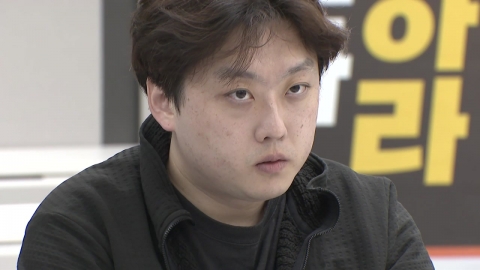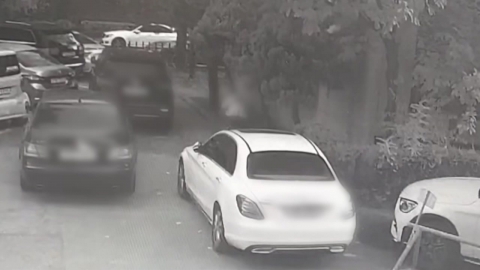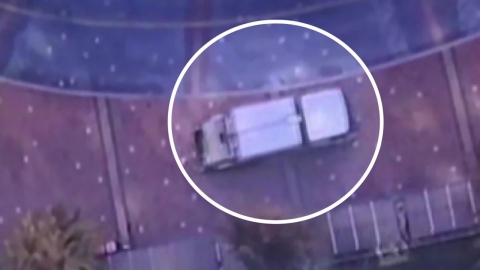■ Starring: Lim Eul-chul, professor of Kyungnam University's Far East Studies Institute
* The text below may differ from the actual broadcast content, so please check the broadcast for more accurate information. Please specify [YTN News PLUS] when quoting.
[Anchor]
North Korea blew up part of the inter-Korean connection road on the Gyeongui Line and the East Sea Line, which was considered a symbol of inter-Korean exchange and cooperation. It's been a day since our military caught the related movement. Let's take a look at what North Korea's intentions are with Lim Eul-chul, a professor at Kyungnam University's Institute for Far East Studies. Welcome. It completely blew up the road connecting the two Koreas in the west and east of the Korean Peninsula. How did you like this part?
[Leave]
On January 15, North Korea held the Supreme People's Assembly, and Chairman Kim Jong-un said it was a municipal speech. The key message I talked about at the time will completely eliminate all these concepts of reconciliation, unification, fraternity, and so on. In the meantime, he said that he would take physical measures irreversibly, but he is now blocking and destroying the Donghae Line road railroad and Gyeongui Line road railroad. So the key message that North Korea is sending is that it is taking steps to physically block the two Koreas to completely eliminate the concepts of unification, peace, exchange and cooperation, and fraternity.
[Anchor]
The Gyeongui Line and the Donghae Line were not built overnight, but were made over the decades from the previous generation to the present. What should we see as the intention to blow them up overnight?
[Leave]
North Korea has declared that it will no longer consider us as its own, has it? So, inter-Korean relations are the two most engaged countries, and physical measures that conform to the concept are needed. It completely blocks inter-Korean relations, as you just said, but it's a road and railway where blood and sweat toward unification or reconciliation have been used for the past few decades, whether the two Koreas have visited North Korea as special envoys or Korean businessmen have visited North Korea for management purposes. North Korea has completely removed it, but as I said earlier, inter-Korean relations are difficult to recover for a considerable period of time from North Korea's perspective.
For now, it is in the best interest of maintaining their system to remain hostile relations between the two countries. Therefore, it is more helpful for North Korea to maintain its system by first separating inter-Korean relations politically, even at the expense of considerable losses. I think they're making this judgment.
[Anchor]
As you said, reconciliation and cooperation between the two Koreas seem to be a long way off. As a result, separated families are bound to be more heartbroken than anyone else, so how long will this continue?
[Leave]
Looking at what North Korea is doing now, I think the inter-Korean relations that have been cut off will be maintained for a considerable period of time in the future. Because structurally, North Korea must give up its nuclear weapons in order to improve inter-Korean relations. That's what the international community is asking for, and that's what our government is asking for now. Therefore, denuclearization became a key condition for resuming inter-Korean relations. However, North Korea says it is a nuclear power, and it will no longer compromise with the Constitution. This is not a deal. I wrote it down like this. So, as long as North Korea sticks to its nuclear weapons, inter-Korean relations are difficult to resume.
[Anchor]
Isn't it a way to make the dust fly and show it in a place where we can clearly see it from our side? Aren't you doing it on purpose with such splendor and stimulation? What do you think of this interpretation?
[Leave]
If you look at the way North Korea does it, there is an aspect that maximizes the effectiveness of propaganda. When we blew up the inter-Korean liaison office in the Kaesong Industrial Complex in June 2020, we decided to show it in a very similar way. So, from North Korea's point of view, they show their will through strong messages, that is, their will, their will to completely cut off inter-Korean relations, and I interpret them as performing such a performance to maximize the effect.
[Anchor]
The land route connecting the two Koreas can only be seen as the JSA passageway in the Panmunjom Joint Security Area or the Arrowhead Hill, but the rest is actually meaningless, right?
[Leave]
That's right. I think it's right to say that virtually all roads connecting the two Koreas have been cut off due to this bombing. And I was talking about the JSA area, which is the Joint Security Area. This is because the UNC is stationed. So when we're barely able to have peace under the Armistice Agreement, the key players in charge of this Armistice Agreement are now in the United Nations, and the UNC is stationed in the JSA. However, in reality, no matter what is the most important role of JSA, all communication channels between the two Koreas have been suspended. The only place where North Korea can communicate with the least is the UN channel, so North Korea has cut off the road, but it is necessary to continue to use the JSA as a dialogue channel that can prevent accidental conflicts by misunderstanding and misjudgment in any way, whether through phone calls or other ways. In that context, physical roads have been almost blocked, but the minimum channel through which we can communicate with each other, whether by telephone or human, is open.
[Anchor]
I heard you have to cross the Gyeongui Line to pass Panmunjom.
[Leave]
That's right. For example, in the past, the envoys of the two Koreas or Chairman Chung Ju-yung went north through Panmunjom while driving cattle, right? Most of them use the Gyeongui Line road. However, if the Gyeongui Line road is blown up and cut off like this, virtually all land routes are blocked. Since the road that goes up North Korea through Panmunjom is also a Gyeongui Line after all, I think we can define that there is no longer any road connecting the two Koreas because North Korea committed such explosions.
[Anchor]
He blew it up with such a physical connection. As you just said, it is known that North Korea has only notified the U.N. Command and not notified the South Korean military, but is there no such contact effort behind the scenes?
[Leave]
That's what I should say. And if you look at the attitude and position of the two Koreas managing the situation, in a way, North Korea and our government continue to stick to the position that they will give in to each other to gain the upper hand. So, it's a situation where we don't show each other an attitude of compromise at all. As a result, I'm watching the two Koreas go on a collision course with each other in a situation where there is no brake system and no safety system at all. Anyway, what we should pay attention to is whether the UNC will just watch the clash between the two Koreas. As you know, the U.S. Forces Korea commander is also serving as the U.N. commander. In that context, I am quite likely to manage the military conflict to some extent.
The situation in the United States right now is that we don't want this kind of conflict on the Korean Peninsula, and the U.S. is actually only a month away from the Russia-Ukraine war, the Israel-Middle East war, the Taiwan crisis. There's an American presidential election. In this situation, if a military conflict occurs on the Korean Peninsula and develops into an uncontrollable situation, in fact, this would not be a situation that the United States wants at all. In that context, I think we should expect that appropriate situation management will certainly be done.
[Anchor]
The explosion blew away 180 billion won in our taxes. After that, the inter-Korean liaison office at the Kaesong Industrial Complex four years ago believed that 44.7 billion won was lost, and we filed a lawsuit for damages to the Seoul Central District Court. How should I deal with this time?
[Leave]
Obviously, I think North Korea's bombing is an act that we must condemn and hold accountable. However, when inter-Korean relations are good, the Gyeongui Line and the East Sea Line railway road have a safer and more profitable infrastructure than when Korean private businessmen enter North Korea. For our company, the government built the infrastructure to support our people traveling to and from North Korea, making it safer, but also getting higher profits by doing business in North Korea. But from North Korea's point of view, I think so. We've never stopped him. We kept the door open for you to come, to come and communicate with people, and to do economic cooperation projects.
But as you prioritize denuclearization, in the end, denuclearization is because if the denuclearization problem is not solved, we cannot overcome international sanctions against North Korea. In order to actively engage in human traffic and economic cooperation, denuclearization must be achieved, and sanctions against North Korea must be eased according to denuclearization so that normal transportation and economic cooperation can be promoted, but that is not working at all. However, North Korea will say that you are not doing it because you prioritize the nuclear issue over our responsibility and comply with social sanctions against North Korea.
So you're much more likely not to acknowledge your responsibility in relation to who you are responsible for. In any case, North Korea's bombing campaign is no longer aimed at meeting with South Korea in any way or by any chance. We will take all such physical, cultural and psychological steps faithful to two hostile countries. It's coming out like this.
[Anchor]
However, some believe that North Korea is not maintaining its regime as it used to be, and is implementing a more stimulating policy of hostility toward the South in order to strengthen the people's loyalty and solidarity, and that this bombing is also doing so on its own to prevent those who want to come from North Korea to South Korea.
[Import]
Very few North Korean defectors have crossed the Military Demarcation Line in North Korea. So, I think it's wrong to see that North Korea is laying landmines and building high barriers to prevent North Korean defectors. Most of those who defected now either came by sea or crossed the North Korea-China border. It is not easy to defect through the heavily armed military demarcation line. Furthermore, roads and railways cannot be routes for defection. How can you use a passage like that when it's the most visible place? I think that's impossible.
It seems that the process of completely blocking and fortifying the Gyeongui and East Sea lines now has the priority to prepare for military conflicts. But they say it's for defense, but these facilities can also be used to attack in the event of a military conflict between the two Koreas. For example, if I look at the remaining tasks in the future, the Kaesong Industrial Complex is still left. Although roads and railways are all suspended. The Kaesong Industrial Complex buildings are still there. However, one of the North's continued warnings is that the Kaesong Industrial Complex will also demolish all of our factories and corporate factories, and such artillery stationed there in the past. In case of emergency, we will deploy the most elite unit that can enter Seoul first. I said that I would deploy heavy equipment. So, the next step is the possibility of eventually arming Geumgangsan Mountain and Kaesong Industrial Complex into bases that can be attacked in case of emergency, which I think is still there.
[Anchor]
As you said, Kaesong Industrial Complex and Geumgangsan Mountain will make any company reluctant to invest, no matter what peace atmosphere comes in the future, right?
[Leave]
In fact, inter-Korean exchanges and cooperation rang the bell. You have to look at it like this. Once again, the condition for resuming inter-Korean exchange and cooperation is North Korea's denuclearization. And according to the denuclearization, there is a situation in which international sanctions on North Korea must be eased. However, North Korea can never denuclearize. This is not a negotiating system. We are saying that even if we negotiate, we will negotiate as a nuclear power. Considering this situation, it is difficult to resume inter-Korean exchange and cooperation or economic cooperation between the two Koreas for a considerable period of time in the future.
[Anchor]
But in fact, if it's interpreted this way, it's the same for any government, for any U.S. government. If it is difficult to talk to North Korea no matter what government, whether Republican or Democratic, is in power, how should we interpret Kim Yo-jong's attitude toward the U.S. military or toward us?
[Leave]
In fact, we can't know the results of the U.S. presidential election. Of course, I believe that if former President Trump is elected, North Korea will try to negotiate and talk on a trial basis. I think there is definitely an aspect of North Korea that opens up a little breath rather than the current Biden administration, if President Trump is elected. But the result is unknown right now. I think North Korea is quite afraid of accidental clashes right now. If an accidental conflict occurs and this escalates, they will inevitably be deeply involved in this war, and if they are deeply involved, it will have a significant negative impact on maintaining their system.
So, from the perspective of North Korea, I think they manage the situation very carefully. But accidental collisions have nothing to do with the intention. As a result, since the UNC is in charge of managing the armistice agreement, drones are flying like this and a situation is being created that requires violating the armistice agreement, so the UNC should play a more active role. I think that's the message you're sending right now.
But the problem is that the UNC is, after all, the United States. I don't know if the U.S. is thinking about how to look at the issue and how to manage it to achieve a more dramatic turnaround, but anyway, the military conflict does not benefit North Korea and does not help the U.N. or the U.S. Because there's a big war going on right now. In such a situation, if there is another war in Northeast Asia on the Korean Peninsula, this will become an uncontrollable situation.
So, I think the priority is to manage the situation on the Korean Peninsula first. Whether it's the United States or the United Nations. That's what I'm seeing, even though North Korea continues to do very dangerous things right now, but the least amount of management is being done now. However, given the various military preparedness and shooting that the two Koreas are currently engaged in, regardless of their intentions, they may not be able to handle it, whether it is the UNC or the United States. That can be said to be a very worrisome part for us.
[Anchor]
Wasn't the Gyeongui Line and the East Sea Line promoted in 2000 to implement the inter-Korean joint declaration between the late former President Kim Dae Jung and Kim Jong-il? Then, Kim Jong-un broke his father's promise, but is this acceptable in North Korean society?
[Leave]
I think the Kim Jong-un regime is also creating a new logic because North Korea is very burdened with that. Why do we have no choice but to cut off all roads, railways, and communications connecting the two Koreas as we go as far as to detonate them? I'm making that logic. If I look at the contents of Chairman Kim Jong-un's speech and his statement, we are continuing to attempt absorption and reunification in the south and continue to talk about the end of the regime. Is it really a reasonable way to maintain our system if we continue to make concessions and have dialogue and negotiations toward the south coming out like this? It isn't that.
Therefore, we are now in a situation where we have no choice but to completely remove this concept of reconciliation and cooperation, whether it is unification or nationality. I'm trying to convince the residents of that. So, from our point of view, we are doing something ridiculous, and we are doing this even by betraying our predecessors' instructions, but North Korea continues to say that we have no choice but to do this, whether targeting elites or ordinary people.
The bombing of blocking roads today is also posted on the front page of the Rodong Sinmun. That's what he's saying, persuading the people of North Korea from their own point of view. South Korea continues to threaten itself, and South Korea and the United States are conducting military exercises from time to time. In addition, there is such a beheading operation to remove our leadership, and the end of the regime continues to rise and fall. That's why we're saying that we're inevitably taking this disconnection.
From our point of view, the North is preparing to do so internally, and what's more worrisome is that in the event of an emergency, it keeps sending drones from the South and makes more military provocations than drones. Can't we just keep watching it? We have no choice but to respond to it. That's how it's coming out. In this part, it is very difficult to solve the problem with only inter-Korean relations, and it is very important for a third party, whether it is the UNC or the United States, to actively manage the situation and seek some dramatic change. Will the UNC or the United States be able to move as such expectations and hopes? That's something you have to watch.
[Anchor]
In the midst of this, Chairman Kim Jong-un convened a military leadership yesterday. It's known to be a kind of meeting like our NSC. I think we discussed countermeasures for the drone flying over Pyongyang now. What do you think we're talking about?
[Leave]
It's a defense security council, kind of. It's the first time we're holding a council like this. Of course, I'm only disclosing some of the contents, but I don't think this is a meeting to respond only to drones. If you look at the contents of this meeting, they are checking each field while preparing for war in case of emergency. So, the top leaders of such departments as the General Staff, the Ministry of National Defense, and the Ministry of National Security are gathered and inspected to maintain the core defense and system. Therefore, it is not just a discussion to respond to the drone crisis, but a defense and safety meeting with the possibility of a larger framework of escalation as mentioned earlier. I think we should look at it like this.
[Anchor]
In a statement on the 10th, Kim Yo-jong said, "If the military could not even identify the drones sent by private organizations to cross the border arbitrarily, it would be a problem," but yesterday, he clearly knows that the main culprit of the Pyongyang drone incident is the South Korean military. After talking about the possibility of a private organization like this, yesterday, the Korean military insisted. How do you think your position has changed?
[Leave]
First of all, we'll say there's a possibility that the drone was picked up. So, when they flew over Pyongyang, they only took pictures. Is it because it's the body of a drone after filming a video? Or if it exploded, if it was a debris or a self-destructive drone, it could not be collected, but Vice Minister Kim Yo-jung said today that they have secured clear evidence. Since he said that he would soon provide clear evidence to prove that the South Korean military was responsible, he probably collected drones and analyzed and evaluated them in his own way. Then, there's some evidence here. Of course, we have to disclose that, and shouldn't our government check that?
Such a process remains, but Vice Minister Kim Yo-jong is so confident that the South Korean military is responsible for it. We have secured evidence to prove that the military was responsible, and it's coming out like this. If this is right, I think this wavelength will be tough. In fact, North Korea sent them a few years ago. I remember that it's 2022. He who sent a drone close to the presidential office in Yongsan has such a history. There is such a thing, but I think that if North Korea clearly proves that it was the South Korean military's responsibility, this repercussion could be much more problematic than it is now.
[Anchor]
I see. Today, I was a professor at Kyungnam University's Far East Studies Institute who will help with the North Korean issue. Thank you for your comment.
※ 'Your report becomes news'
[Kakao Talk] YTN Search and Add Channel
[Phone] 02-398-8585
[Mail] social@ytn. co. kr
[Copyright holder (c) YTN Unauthorized reproduction, redistribution and use of AI data prohibited]
Politics
More- National Security Office, British National Security Adviser Call...Discussing Russia's Response to the Book
- [News NIGHT] Han Donghoon, who celebrated his 100th day in office...Lee Jae-myung Urges 'Representational Talks'
- Grandfather Lee Chun-sik also received compensation for forced labor...The eldest son, "Cancel it"
- "Hard struggle," "Looking bigger"...100 Days, Mixed Ratings






![[Y-issue] Producer? Representative?Hive vs. Min Hee-jin Continues Conflict Despite Court and Board Decisions](https://image.ytn.co.kr/general/jpg/2024/1030/202410301654521717_h.jpg)

![[Company] Nexon announces its 'NEXT ON' strategy to lead the future](https://www.ytn.co.kr/img/news/default_img.jpg)
